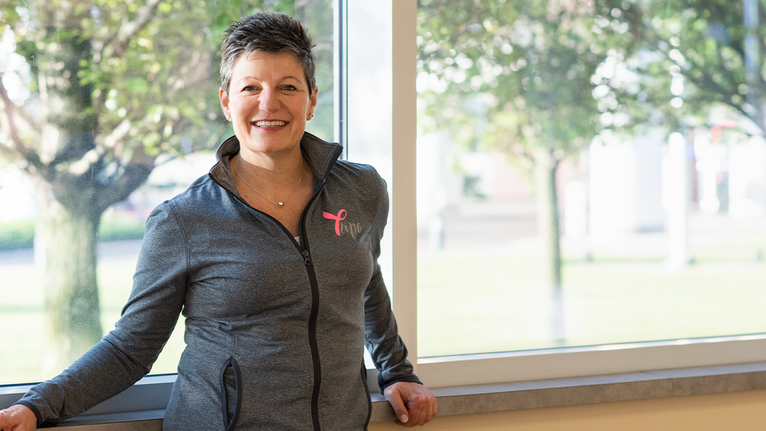Enhancing Life After Cancer with the Cancer Survivorship Program
For Jill, that is where the University of Cincinnati Cancer Center Cancer Survivorship and Supportive Services Program became an indispensable resource for her—providing personalized care that encompassed evidence-based interventions, disease surveillance, healthy lifestyle promotion and support and resources for family and caregivers.
As the largest survivorship program in the region, it offers more than 20 types of services and therapies as well as the region’s first oncology primary care clinic—designed to provide primary care services specifically focused on the needs of adults with a history of cancer.
Melissa Erickson, MD, UC Health primary care physician, medical director for the University of Cincinnati Cancer Center Cancer Survivorship Program and adjunct assistant professor in the Department of Family and Community Medicine at UC College of Medicine, says cancer patients have many side effects related to their illness and treatments.
“The survivorship program was created to improve quality of life and promote overall health and wellness by addressing treatment-related side effects such as fatigue, pain and mental health concerns,” Dr. Erickson explains.
“Patients who participate in these services say that they finally feel heard. They no longer have to suffer in silence or just be grateful that they survived their cancer,” Dr. Erickson says. “They appreciate that someone is specifically addressing these needs and working with them to develop a plan. It aids in their recovery by improving quality of life and increasing the likelihood of adhering to cancer surveillance and/or long-term cancer treatment.”
Jill has taken advantage of several survivorship offerings, including the Cancer Exercise Wellness Program offered within the Daniel Drake Center’s Outpatient Rehabilitation at the UC Health West Chester Campus.
Personalized training and exercise routines for cancer survivors are delivered by a multidisciplinary team of exercise physiologists, respiratory therapists, nurses and physicians. With their help, Jill has adopted an exercise and weightlifting routine that helps with core strengthening and conditioning of her arms, which were hard to lift above her head after reconstruction surgery.
“When you are recovering from treatment–radiation, chemotherapy or surgery–you feel unsure about how to get back to normal movements and exercising,” Jill says. “I had surgical scars on many areas on my body and I didn’t know what I could and could not do. It makes me feel much more comfortable working with therapists who are trained in cancer recovery and who can offer personalized therapies to address my specific needs.”
“Treatment for our patients is never cookie-cutter,” Chad Balilo, manager for Cardiac, Pulmonary, Cancer and Vascular Rehabilitation and Wellness at Daniel Drake Center for Post-Acute Care says. “Each person is unique, from diagnosis to recovery. We assess the multiple needs of each patient carefully as we deliver an individualized, evidence-based solution. Cancer exercise is not as prevalent a topic as exercise science is for heart disease. Providing patients, caregivers and the community with encouragement, education and other resources can help make the benefits of exercise more well known.”


